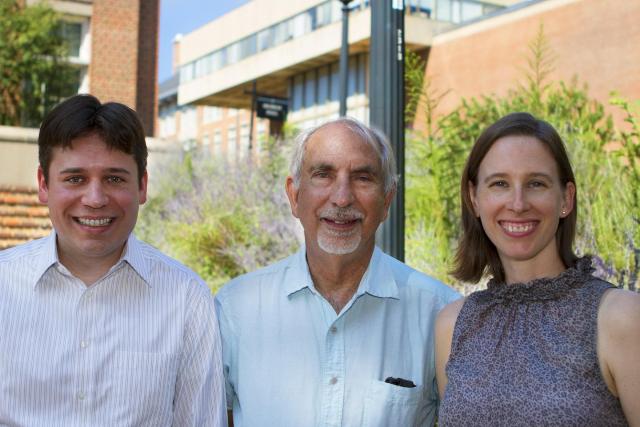Sep 21 2015
The University of North Carolina at Chapel Hill, NC State and Duke are launching a partnership to dramatically broaden access to nanotechnology facilities and expertise to faculty, students, businesses and educators across the Triangle and nationwide. The goal is to encourage both traditional and non-traditional users of these highly specialized and expensive pieces of equipment across the three universities in order to mix ideas and push the limits of innovation.
 This image shows Jim Cahoon, co-PI of the nanotechnology network grant, Ed Samulski, chair of the applied physical sciences department and Carrie Donley, director of CHANL. Credit: Lars Sahl/UNC Chemistry Department
This image shows Jim Cahoon, co-PI of the nanotechnology network grant, Ed Samulski, chair of the applied physical sciences department and Carrie Donley, director of CHANL. Credit: Lars Sahl/UNC Chemistry Department
The partnership, called the Research Triangle Nanotechnology Network (RTNN), is led by NC State and is supported by a five-year, $5.5 million grant from the National Science Foundation.
"Nanotechnology is a driving force behind scientific innovations that can range from the electronics in smartphones to new types of medical treatments," said Jim Cahoon, assistant professor of chemistry in UNC's College of Arts and Sciences and co-principle investigator of the grant. "To succeed, scientists need a comprehensive set of 'nano-tools' that allow them to create and visualize these small systems, which can open up a new world of possibilities and ways of thinking about their work."
At UNC, the effort will be led by The Chapel Hill Analytical and Nanofabrication Laboratory (CHANL), a hub for experimentation and discovery based in the department of applied physical sciences, which was created last year (the first new department at UNC-Chapel Hill in 40 years) to house faculty whose work does not fit within any one traditional discipline. The lab has 20 pieces of equipment plus several smaller pieces of support equipment that will all be made available to anyone who would like to explore how to use them in their work.
Carrie Donley, director of CHANL, is excited about the outreach focus of the grant, which will include components like the development of graduate student peer-to-peer networks, where students can help train each other on how to use certain pieces of equipment, even long distance.
"One barrier to innovation is that graduate students at institutions three or four hours away may decide to not use this equipment because they cannot make the hours-long trip as frequently as they need to," said Donley. "Now, they can make one trip to learn how to do the experiment and meet a graduate student expert who will be their partner for future experiments when samples are sent via mail, dramatically decreasing the funds required for travel and increasing the amount of science that can be done.."
The three institutions will also partner with the Morehead Planetarium and Science Center, via the annual North Carolina Science Festival, to develop 'Nano-Nights,' taking experiments that demonstrate nanoscience principles to grades 7-12 classrooms, explains Donley. Another aspect of this initiative is making community college connections. The partnership will have a summer workshop for community college faculty to learn new ways they can include nanoscience in their existing classes.
"For businesses, our goal is to help them develop new products, improve existing ones, and help them move discoveries to market," added Jacob Jones, a professor of materials science and engineering at NC State and principal investigator of the grant. "For educators, we want to introduce them to nanotechnology and give them resources they can use in the classroom."